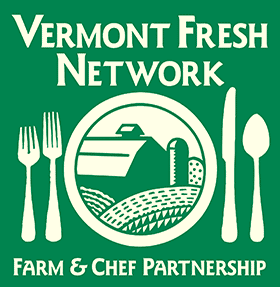Food Labels - Animal Welfare
 August 31, 2018
August 31, 2018
This is the fourth installment in a series taking a closer look at some common food labels. For a quick snapshot of common labels found in Vermont look at our labeling guide. This information is part of VFN's work to improve communications between Vermont chefs and Vermont food producers, including through our updated and expanded member-to-member business directory (if you're a current VFN member, you can login now to view the directory and update your listing - don't remember your login info? Email info@vermontfresh.net).
Of course the first Vermont farm on the ASPCA’s list of animal welfare certified farms makes caramels. We’re Vermont. We’ve got bird friendly maple syrup and goat friendly caramels.
This list of farms with animal welfare certifications includes VFN Partner Members Health Hero Farm, Shelburne Farms, and Shire Beef (if you should be on there, contact farmanimalwelfare@aspca.org to update). The published list is part of a larger effort by the American Society for the Prevention of Cruelty to Animals (ASPCA) to provide consumers with tools to make animal-friendly purchases, the “Shop With Your Heart” project. And no, before you ask, it does not require everyone to be vegan. We’re talking about the world of animal welfare that does include eating animal products - the vegan debate is not one we’re tackling in our food labels series.
Earlier this winter, the ASPCA appeared on the VFN site when the Vermont legislature considered a proposal to help small scale farmers gain animal welfare or humane certification (both terms can be used interchangeably, we’re going with animal welfare from now on). The legislation did not succeed last session, but will be re-introduced. They had worked with Vermont Law School to put together a farmer’s guide to the primary certification programs - Animal Welfare Approved, Certified Humane, and Global Animal Partnership.

As with any labeling program, the three differ in some of the particulars of which animals they certify, the specific standards used, and what operations they will audit. Strong humane standards are very detailed, including requirements for living space, light, fresh air, physical treatment, weaning practices, indoor and outdoor enrichment, nutrition, and more (this guide takes a closer look). Of the three major labels, Animal Welfare Approved (AWA) - which is both comprehensive and free - covers the longest list of animals and also the greatest number of outlets, including distributors and restaurants.
Perhaps the most important thing here is that these labels are NOT American Humane Certified.

The oldest humane certification (the organization began in 1877, the certification in 2000) is also one of the least valid today. American Humane baseline standards don’t go much beyond conventional industry standards. For example, access to the outdoors is not required for chickens, beef cattle, or pigs, nor are there standards for adequate living space . . . two items that the vast majority of Americans consider an essential part of humane treatment (according to Consumer Reports). “American Humane Certified” standards are meek, while consumer demand for humane products is strong, and food companies know it. For example, in 2014 American Humane garnered ire, and at least two Federal Trade Commission complaints, when it certified Butterball turkey products - neither the complaints nor the bad press seem to have had effect, though, since in April 2018 they highlighted Butterball as an exemplary producer on their website.
There’s been a common pattern in each of the labels we’ve looked at in this series: consumer education to care about these issues, immediately followed by challenges from businesses that promise those values (often at a cheaper price) without delivering. Humane certification isn’t alone. There are unique elements to each story: a search for appropriate mechanisms to enforce local standards, an emerging system to go beyond federal minimums for organic, a flood of misleading international products for grassfed. . . it might be taking it a bit far to say there’s a solid villain in the humane certification plotline, but that’s one way to look at it.
An important positive trend for animal welfare is the increasing demand from institutions and other large purchasers for meaningful certifications. This interest often comes as part of more comprehensive sourcing guidelines that tackle the environment, animal welfare, worker treatment, support of local communities, and contribution to good health. Kara Shannon at ASPCA points to the Real Food Challenge and the Good Food Purchasing Program as initiatives driving a national interest in strong welfare certification.
The Real Food Challenge, which focuses on mobilizing students at college campuses, is a framework used here in Vermont, where UVM became the 5th college in the nation to sign a pledge. Last March, UVM announced that it had met its 20% Real Food goals 3 years early, and so would strive for 25% by 2020. Other Vermont signatories to the challenge of at least 20% ‘real food’ by 2020 are Sterling College, Northern Vermont University - Lyndon, Marlboro College, and Middlebury College. The goals of harnessing these efforts across the country is to reach $1 billion in school food budgets focused on foods that meet the Real Food criteria by 2020.


